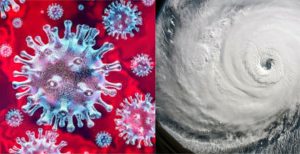
[Reprinted: WKZO 5-29-2020]
Ken Hutton is worried Great Abaco Island in the Bahamas where he lives is far from rebuilt after being devastated by Hurricane Dorian last year yet he is bracing for another hurricane season in the midst of the coronavirus pandemic. The business consultant feels lucky to have survived Dorian, which tore the hurricane shutters off his house and sucked out the windows.
Yet there is still no running water or power in his area – he relies on a generator and a well – and many of the organizations that had been helping to rebuild suspended work because of the pandemic.
“We are still in no position to be ready for another hurricane,” he told Reuters Tuesday. Already, the Caribbean has been hit by two tropical storms before the official start of the hurricane season on June 1, one of which started right over the Bahamas, Hutton added.
“There are lots of people walking around here now with post-traumatic stress disorder,” he said.
Hurricane Dorian caused $3.4 billion in damages – more than a quarter of the annual output of the Bahamas or the equivalent of the United States losing the combined outputs of California, Texas and Florida, according to the Inter-American Development Bank.
Across the Caribbean, island nations are now facing the double whammy of a hurricane season forecast to be more active than usual combined with a pandemic that has already drained public coffers and leveled tourism, one of its top earners.
The National Oceanic and Atmospheric Administration last week forecast 13-19 named storms this year, following 18 named storms last year and 15 in 2018, both above the average of 12.
But the Caribbean has used up much of the fiscal buffers it would usually have readied to respond to hurricane season, Caribbean Development Bank President Warren Smith said. Countries have tapped typical sources of external emergency financing, like the International Monetary Fund (IMF), to respond to the coronavirus crisis, further limiting their funding options.
Meanwhile, new health protocols for hurricane season prep comes at an added cost. The Caribbean Disaster Emergency Management Agency (CDEMA) has revised guidelines to prevent the virus’ spread, including social distancing, personal protective equipment and hand cleaning facilities in shelters, said CDEMA head Elizabeth Riley.
“We can’t put as many people into a shelter (with social distancing), which means we must have many more shelters available,” St Lucia Prime Minister Allen Chastanet told Reuters.
ECONOMIC STORM
Caribbean nations have had to absorb the high costs of managing virus outbreaks even as they have lost revenue from the stop in tourism caused by border closures and lockdowns, while also being forced to provide a welfare safety net to more people.
The economic outlook does not look set to improve any time soon, with the Caribbean facing a regional contraction of 6.2 % according to the IMF.
“Small island states rely heavily on tourism and remittances. Both are now at a standstill,” United Nations head Antonio Guterres said on Thursday. “Households that had a secure income are at imminent risk of poverty and hunger.”
He added that alleviating “crushing” debt “must be extended to all developing and middle-income countries” that request forbearance as they lose access to their main financial markets.
But it is not all doom and gloom. In Cuba, a meme went viral on social media in recent weeks appearing to present a duel for television airtime between the country’s chief epidemiologist and its most renowned weatherman as they cover the two crises.
The weatherman, Jose Rubiera, told Reuters much of what happens will depend on each storm’s route.
“One single hurricane can be devastating whereas you can have many that don’t hit,” he said. “It’s all very relative, but the one rule of thumb is to always be well prepared.”